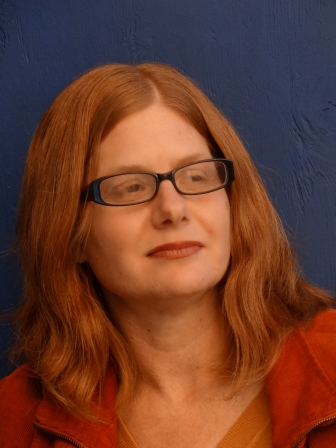 In my last post, “A Pro-Science, Skeptical Woman Speaks” I interviewed a woman with whom I share many views in common. One of my goals here at Feminism and Religion is to introduce different secular, atheistic, liberal feminists who share many of the same ethical views as regular contributors and readers, but not the same “religious” or “spiritual” ideas. In this post I examine an online support network for unbelievers, Grief Beyond Belief, and ask a few questions to its founder, Rebecca Hensler.
In my last post, “A Pro-Science, Skeptical Woman Speaks” I interviewed a woman with whom I share many views in common. One of my goals here at Feminism and Religion is to introduce different secular, atheistic, liberal feminists who share many of the same ethical views as regular contributors and readers, but not the same “religious” or “spiritual” ideas. In this post I examine an online support network for unbelievers, Grief Beyond Belief, and ask a few questions to its founder, Rebecca Hensler.
I met Rebecca in February in San Francisco while on a visit I made to meet with the Unitarian Universalist Association in regards to my ordination. My girlfriend and I met Rebecca in North Beach, San Francisco for dinner and drinks. I experienced her as a compassionate, friendly, and genuine person. Her experiences and insights inspired me to think more about the role of grief and pain among unbelievers. I mean, atheists cry, agnostics experience loss, skeptics lose family members, and we do it all without a “God” or “spirit” to help us. And if we were to meet C.S. Lewis, we would make
sure to exclaim, “No…pain is not some megaphone for God to rouse a deaf world.”
Why did you start Grief Beyond Belief?
The original idea was born of my own grief. After my son died, I found a group in which to share comfort and compassion with other grieving parents: The Compassionate Friends, a mainstream parental grief support organization with a strong online presence. It was so close to exactly what I needed, but I frequently felt alienated by the religious and spiritual content — not just the offers of comfort that depended on beliefs I do not hold, but the assumption that everyone there held some sort of belief in life after death. And the assumption, so common in mainstream grief support, that even if I am not the same religion as you are, I have a religion, and I believe in some sort of afterlife was equally alienating and hurtful.
It didn’t take that much imagination to realize that the same sort of support could be provided to nonbelievers, just free of religious and spiritual content. But Grief Beyond Belief would have remained just a wish — a good idea but something I would have learned to live without — if Greta Christina hadn’t explained to me how great was the need for the kind of community I imagined among atheists and other freethinkers. Many atheists had written about it, but no one had stepped up to make it happen.
The final push came from my own impatience, my own tendency to get frustrated when everyone seems to know something needs to get done and no one is doing it. Even as a little girl, I was known for saying, “I’ll do it myself!” Founding Grief Beyond Belief was definitely an “I’ll do it myself!” moment.
Why does it trouble you when someone tries to counsel a nonreligious person with theologically loaded phrases?
I think that should be easy for religious people to understand why an atheist might be troubled by comfort based in religious beliefs. Simply imagine how it feels to be comforted by a religious belief you do not hold. Is a Christian widow comforted by being reminded that her husband who died in combat is drinking with Valkyries in Valhalla?
As for, “I’m praying for you,” the religious may want to consider that to many who do not believe in the power of prayer, “I’m praying for you” sounds like “I am choosing to do nothing for you.” It feels like the speaker is either avoiding offering practical help or avoiding the admission that there is nothing they can do to take away the pain of bereavement.
But to speak for myself in particular, any comfort based on the idea that I will someday be reunited with my son doesn’t just fail to comfort me, it hurts me. The agonizing fact that my son is gone from me forever is being dismissed with a facile promise that I know cannot ever be fulfilled. It is far more comforting to validate my pain than to brush it off with fantasies about cherub wings and heaven.
How can religious feminists better understand the need for secular forums for dealing with grief?
I would think that feminists — especially feminists that have been involved in any sort of feminist activism, education or organizing — shouldn’t have any problem understanding why atheists and other freethinkers need a separate space to process the ideas and emotions of grief. In particular, those who have been harmed by discrimination, harassment and ostracization due to their atheism need a space that feels safe in which to mourn, heal, and learn from each other how to move forward with grief in their lives.



Particularly poignant to read this post –especially coming after Roger Ebert’s “I do not fear death.”
http://www.salon.com/2011/09/15/roger_ebert/
LikeLike
This is a moving and much needed post. Although, I have a spirituality, I too get annoyed with platitudes, and promises of angels and heaven when people hear that my son died.
I think it helps people avoid their own fears and the harrowing pain of grief. It doesn’t help the person grieving at all and is exceptionally selfish. Particularly, as none of us get off free from losing loved ones at some point in our lives.
LikeLike
“we need to be very, very humble as regards the limitations of our human understanding.” Thank you, Ross, for this reminder. I marvel at the certainty with which “belief” and traditional understanding are used to drive public policy and shape our public conversations about how we treat each other. We know so little and we are reminded of the “limitations of our human understanding” constantly. Confronted with new evidence, we meekly alter what we once knew so confidently about the age of the planet, for example. The Catholic Church needs a good dose of the kind of humility you allude to as it tries to figure out how to show LGBT Catholics that they are loved and welcomed even as they find the doors of the shut in their faces when it comes to marriage and raising families. http://abcnews.go.com/Politics/week-transcript-cardinal-timothy-dolan/story?id=18841802&page=6#.UWB98BlAsQA
LikeLike
Thank you for this post and the link. As a counselor, I find it very helpful.
LikeLike
Great post. Second the notion that having a spirituality does not mean that a person believes in life after death or the justice of whatever happens in the world.
LikeLike
If there truly is life after death, then it can be understood as a scientific fact, and certainly a joyful one, but not dependent on religious belief. We know so little about the essence of being, the nature of time and a million other parameters of the cosmos, so that we need to be very, very humble as regards the limitations of our human understanding.
LikeLike